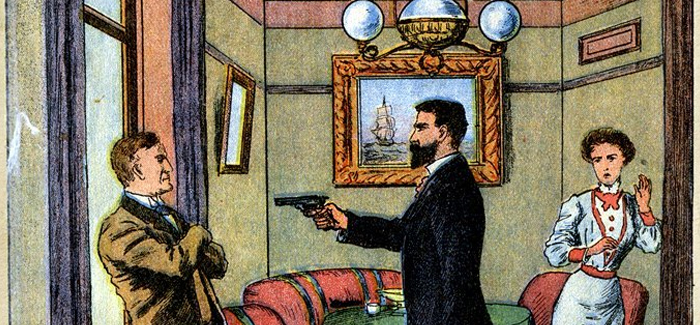
Artwork from the cover of Murder Most Russian.
The Magazine lists a selection of general-interest books, films, and albums by alumni. For additional alumni releases, browse the Magazine’s Goodreads bookshelf.
Murder Most Russian: True Crime and Punishment in Late Imperial Russia
Louise McReynolds, PhD’84
Author
Following Russia’s disastrous defeat in the Crimean War, Tsar Alexander II (1855–81) implemented a series of reforms, including a sweeping overhaul of the national legal system. The introduction of juries and public trials transformed the courtroom into a theatrical spectacle, with reporters covering murder cases extensively and audiences waiting breathlessly for updates. Louise McReynolds chronicles several such trials and the brutal and often sensational murders behind them, analyzing what the crimes reveal about societal changes in late imperial Russia.
The Forgotten Presidents: Their Untold Constitutional Legacy
Michael J. Gerhardt, JD’82
Author
Criticized for his inaction as president, Calvin Coolidge did little that is widely remembered—upon his death, Dorothy Parker quipped, “How did they know?” Still, says Michael J. Gerhardt, Coolidge did leave his mark, supporting groundbreaking laws and advancing constitutional convictions that remain important to conservative political thought. In his book, Gerhardt analyzes the terms of Coolidge and 12 other unmemorable presidents, arguing that their leadership was less weak or ineffective than popularly imagined. Moreover, says Gerhardt, these forgotten figures’ stories illustrate pitfalls of the office, for instance how it draws presidents into the use of prerogatives, often at the expense of political support.
Elizabeth Scarboro, AB’91
Author
One summer in Boulder, Colorado, 17-year-old Elizabeth Scarboro fell in love with her high school classmate Stephen, who had blond shaggy hair, a leaned-back walk, and cystic fibrosis. Although her boyfriend was expected to live only until age 30, Scarboro chose to embrace the relationship, and the couple eventually married. In this memoir, the author traces the ten years she spent with Stephen before his death of CF complications. Tales from ordinary early married life—failed road trips and purchasing a small home beside a trash-filled lot—unfold against the ever-present background of her husband’s illness.
Not Hollywood: Independent Film at the Twilight of the American Dream
Sherry B. Ortner, AM’66, PhD’70
Author
The independent film world thinks of itself as telling the truth, combatting the lies and falseness of Hollywood movies, says Sherry B. Ortner. Gradually these films have gained popularity, forming a viable niche market. Through analysis of independent works—L.I.E., Slacker, Thirteen—Ortner argues that during the past three decades such movies have functioned as an important form of cultural critique.
Catherine Chung, SB’01
Author
Catherine Chung’s novel tells the story of Janie, who was born in South Korea and moved to Michigan with her parents and younger sister, Hannah. Determined to break free from her family, Hannah simply vanishes one day while attending college in Chicago. As Janie searches for her sister, the characters confront painful truths about their past and present.
Prospero’s Son: Life, Books, Love, and Theater
Seth Lerer, PhD’81
Author
In this memoir, humanities scholar Seth Lerer describes his complicated relationship with his father—a flamboyant teacher and lifelong actor with a pompadour, an eye for stylish clothes, and the ability to command an audience. The author recalls how his father embarked on many whirlwind adventures, including an impulsive move to Cambridge, Massachusetts, and eventually came to terms with life as a gay man. Ultimately, Lerer chronicles two evolutions: his father’s and his own.
The Jet Sex: Airline Stewardesses and the Making of an American Icon
Victoria Vantoch, AB’97
Author
In the postwar period, airline stewardesses became celebrated icons of American womanhood. They seemed to appear everywhere, from print ads to television commercials to Richard Nixon’s inaugural ball in sequined minidresses. Stewardesses, says Victoria Vantoch, embodied mainstream America’s ideal woman: young and beautiful, intelligent and charming. They gracefully bridged the gap between demure 1950s housewife and emerging career woman and, Vantoch argues, subtly challenged traditional gender roles, paving the way for the women’s movement.
